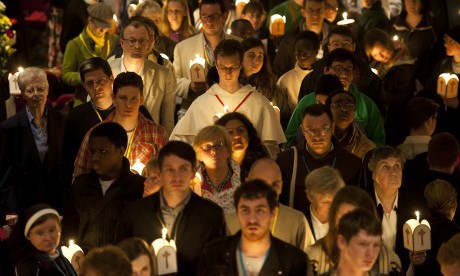After growing up in Nigeria and being named the youngest bishop in the world at the age of 32, Cardinal Francis Arinze attended the final session of the Second Vatican Council.
Following his elevation to cardinal by Pope John Paul II, he was appointed President of the Pontifical Council for Interreligious Dialogue, a position he held until 2002, when he became the first African Cardinal to head a Vatican office, the Congregation for Divine Worship and the Discipline of the Sacraments (2002-08).
His biography, God’s Invisible Hand, was published by Ignatius Press, as were his books The Layperson’s Distinctive Role, and Meeting Jesus and Following Him.
Cardinal Arinze’s most recent book, also published by Ignatius Press, is Radical Discipleship: Consecrated Life and the Call to Holiness (2015), released in conjunction with the Year of Consecrated Life, which began on November 30, 2014 and will conclude with the Feast of the Presentation of Jesus in the Temple on February 2, 2016.
Cardinal Arinze corresponded this past week with Catholic World Report about the meaning and uniqueness of consecrated life, the roots and development of consecrated life, and some of the challenges facing embracing and living the consecrated life today.
CWR: In the Introduction to Radical Discipleship, you focus on how discipleship consists of accepting Jesus invitation, “Follow me.” In what unique ways is the consecrate life an embrace of the call to radical discipleship?
Cardinal Arinze: The consecrated life is an embracing of the call to radical discipleship, the call to follow Christ in a radical way, because the consecrated person takes the vows of chastity, poverty and obedience. The life of Jesus was a model of the three virtues lived to an extraordinary degree of commitment. All followers of Christ are indeed called to live three three virtues, but not in the same way. Consecrated people live the three virtues as vows binding them for their whole lives. Continue reading
Sources
